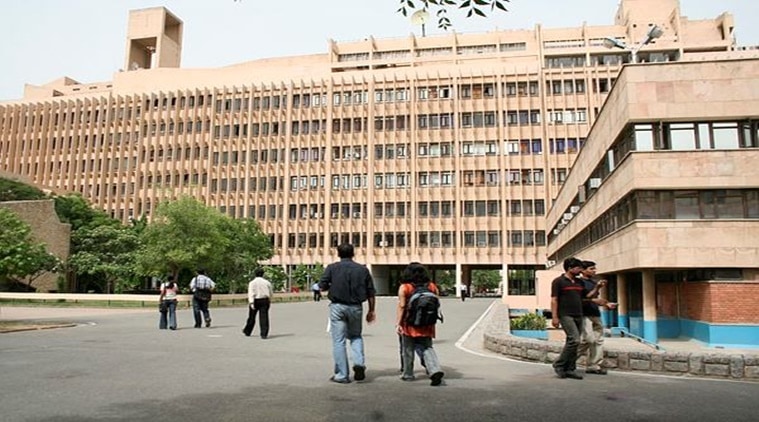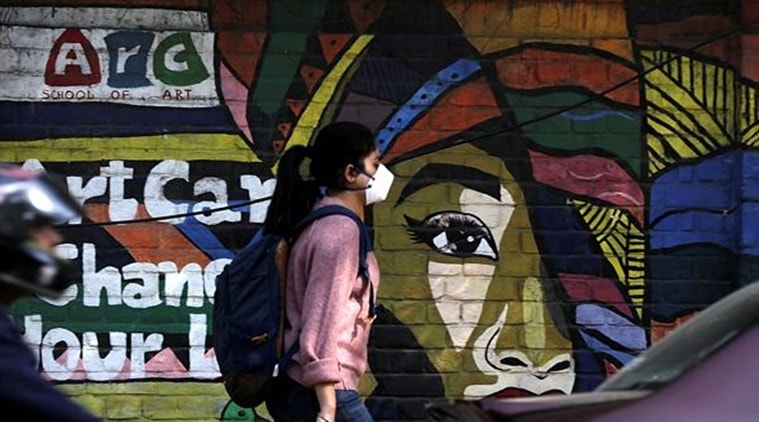 Colleges preparing to open up. (Express Photo)
Colleges preparing to open up. (Express Photo)
As colleges begin to prepare for on-campus classes from August, keeping to UGC guidelines to maintain ‘social distancing’, is going to be a mammoth task, with crores of students and lakhs of institutes across India. Even as masks, sanitisers and thermal check-ups at entry points become mandatory, ensuring the safety of students in hostels, common facilities like canteens, and while commuting is among the key challenges faced by institutes.
Meanwhile, the classes will be further divided into smaller groups, implying teachers will have to increase the number of hours at work. This, while online classes would still be continued for those who not able to join institutes right away. This raises concerns around teachers’ safety, maintaining student-teacher ratio, and quality of education for institutes.
Considering these challenges, the Indian Institutes of Technology (IITs) have sought permission from the Ministry of HRD to continue classes in the digital mode for the next semester and reopen institutes from January. Talking to indianexpress.com, director of IIT-Madras, the best Institute in India as per NIRF ranking, Bhaskar Ramamurthy said, “We lack the capacity to bring back all our students. Most of the rooms in the hostels are on double-sharing and the construction of newer hostels is ongoing. We do not have the infrastructure to provide single rooms for all the students; this is the case with all IITs. We will come up with a common solution soon. We are looking at a model where digital and offline learning can go together. We can start with some students on campus, but not yet.”
Campus as an isolated unit
And those who are opening their doors are considering several new initiatives. The Indian School of Hospitality (ISH), for instance, is planning to open to full capacity by isolating the entire campus in a huge bubble to keep students and teachers safe. The ISH is planning to ask all students to reside in hostels, including day-boarders and from hostel rooms to classrooms to the canteen, everything will be sanitised regularly. In case a student has to travel, they will be made to do so in the transport offered by the institute. Through this, they aim to ensure the entire campus and students function as one unit and minimise contacts from anyone externally.
A similar plan has been followed by Ansal University, which had its hostels running even during the lockdown due to the high number of foreign students in the varsity who could not fly back home. The university treated the entire campus as an isolated unit during lockdown and the efforts will be accelerated as it reopens.
 Wearing masks, thermal check-ups and sanitisation will be must in all colleges (Express Photo)
Wearing masks, thermal check-ups and sanitisation will be must in all colleges (Express Photo)
“A campus is like a small town. Dealing with a population of 200 students under the same roof in addition to the support staff is a very different challenge. But we have put in rules including reducing the capacity of hostel rooms to one or two occupancies at max. Wearing masks, whenever a student is stepping out of hostel rooms; limiting contact between day-boarders and hostel dwellers; restricting and monitoring students’ movements in and outside the campus are some norms in place. Besides, a floor-wise schedule to use the dining area and other common facilities. There will be no visits until the Coronavirus pandemic is over, including weekend outings and home visits for one semester,” informed the vice-chancellor while stating that these norms might come across as restrictions for students but are mandatory to ensure no contamination.
COVID special scholarships, fee-cuts
Several institutes have also offered late fee payments, zero-interest loans and special fee cuts for those fighting the pandemic at the forefront or affected by it.
Chandigarh University is going a step ahead and is offering a 10 per cent quota or reservation especially for the children of those fighting at the forefront including children of doctors, paramedical staff, policemen, garbage collectors, etc. An additional fee rebate of 10 per cent for their entire course duration at the university from a kitty of Rs 5 crore has also been announced for the coming admission cycle by the varsity.
Lovely Professional University (LPU), Phagawara is also offering free education for children of those affected by coronavirus and frontline workers. The university is going to bear the cost for these students, for which it has dedicated Rs 20 crore.
LPU has also reduced the minimum eligibility to avail the available merit-based scholarships to as low as 70 per cent marks. Further, since students do not have results of class 12 boards or final-year UG result, the university has decided to avail the scholarships on the marks obtained in class 12 for PG scholarships and class 10 for UG courses.
Several other institutes believe that people have been indirectly affected because of the pandemic and hence are offering options of ‘pay-later’. ISH, Kolkata is allowing students to take up zero-interest loans to students on their college fee. This means a student can study without making any payment, but also have the option to pay their fee in installments. These installments will be decided based on the package students get. They will be allowed a time of four years for this, Dilip Puri, director of the institute informed indianexpress.com.
Colleges to run double shift
Several colleges are also running in double shifts, where some students will be made to come in the first half and others in the second. JK Lakshmipat University, for instance, will run from 9 am to 6 pm. During this time, students and teachers will be given a staggered scheduled to visit the campus followed by timely sanitisation. The JKLU pro-vice-chancellor told indianexpress.com that the institute has 12:1 student-faculty ratio which will ensure that every class has a proper distribution of teachers without making them work double shifts.
For ITM Institute of Health Sciences, Maharashtra, there will be alternate day scheduling of batches to ensure the student-teacher ratio. Each class will be split into two and one-half of students will be called on day 1 and the other half on other days. To ensure this does not mean only alternative days of study, the institute will also hold online classes. The faculty will also alternate between online and offline teaching. Among those who attend college, masks, sanitisers, and the AarogyaSetu app is a must.
Further, the institute will transport students from home to campus and back to ensure they do not come in touch with outsiders. The number of bus trips, claims the institute, will also be increased in order to maintain social distancing while seating.
Higher institutes are also conducting online orientation for students. While IIMs have held days long online orientation, Pearl Academy, for instance, is holding a four-module course called ‘pre-semester learning’ from July 1 even as the classes will begin from August. The pre-learning will include ‘Around the world in 60 days’, ‘Whose class is it now?’, ‘Socially plugged’ and ‘Create a new world’.